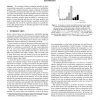Free Online Productivity Tools
i2Speak
i2Symbol
i2OCR
iTex2Img
iWeb2Print
iWeb2Shot
i2Type
iPdf2Split
iPdf2Merge
i2Bopomofo
i2Arabic
i2Style
i2Image
i2PDF
iLatex2Rtf
Sci2ools
117
click to vote
ECAI
2004
Springer
2004
Springer
Evaluation Strategies for Planning as Satisfiability
Abstract. We investigate different evaluation strategies for planning problems represented as constraint satisfaction or satisfiability problems. The standard evaluation strategy, evaluating the formulae by sequentially increasing the length one step at a time, guarantees that a plan corresponding to the first satisfiable formula is found first, yet this is often not the best possible strategy in terms of runtime. We present evaluation strategies based on parallel or interleaved evaluation of several formulae and show that with many problems this leads to substantially improved runtimes, sometimes several orders of magnitude. The cost of the improved runtimes is a possible decline in plan quality because an optimality guarantee of the standard evaluation strategy is lost.
Artificial Intelligence | ECAI 2004 | Evaluation Strategies | Satisfiability Problems | Standard Evaluation Strategy |
Related Content
| Added | 20 Aug 2010 |
| Updated | 20 Aug 2010 |
| Type | Conference |
| Year | 2004 |
| Where | ECAI |
| Authors | Jussi Rintanen |
Comments (0)

